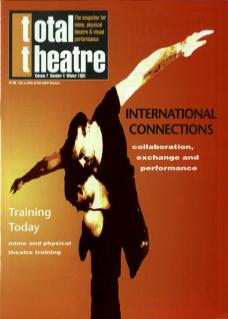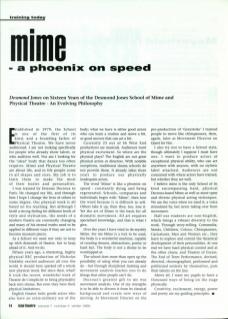Established in 1979, the School is one of the first of its kind, and a founding father of Physical Theatre. We have never auditioned. I am not looking specifically for people who already show talent, or who audition well. Nor am I looking for the 'ideal' body that dance too often requires. Mime and Physical Theatre are about life, and in life people come in all shapes and sizes. My job is to train them to make the most of their bodies and personalties.
I was trained by Étienne Decroux in Paris. He changed my life, and through him I hope I change the lives of others to some degree. Our physical work is all based on his teaching. But although I instil a strong feeling for different levels of style and stylisation, the needs of a modern theatre are constantly changing and many of his eternal truths need to be applied in different ways if they are not to become museum pieces.
As a School we need not only to keep up with demands of theatre, but to keep ahead of it. And we do.
Fifteen years ago, a shattering, highly physical RSC production of Nicholas Nickleby excited audiences all over the world. It should have sparked off a whole new physical trend. But since then, what? It took the recent, wonderful work of Theatre de Complicite to bring physicality back into drama. But even they have their physical limitations.
English theatre lacks goods actors who also have an extraordinary use of the body; what we have is either good actors who can learn a routine and move a bit, or good movers that can act a bit.
Currently 23 out of 46 West End productions are musicals. Audiences want physical excitement. So where are the physical plays? The English are not great physical actors or directors. With notable exceptions, traditional drama schools do not provide them. It already takes three years to produce our physically inadequate actors.
The word 'Mime' is like a phoenix on speed – constantly dying and being regenerated. Schools, companies and individuals begin with 'Mime', then lose the word because it is difficult to sell. Others take it up, then they, too, lose it. Yet the art of Mime is the basis for all dramatic movement. All art requires specialised knowledge, and that is what I give.
Over the years I have tried to demystify Mime. For me Mime is a tool to be used; the body is a wonderful machine, capable of creating dreams, abstractions, poetry or hard fact. The body is not a shrine to be worshipped at.
The school does more than open up the possibility of using what you can already do – but through disciplined training and movement analysis teaches you to do things that other people can't do.
Decroux's greatest gift to me was movement analysis. One of my strengths is to be able to divorce it from its classical background and create new ways of moving. As Movement Director on the pre-production of Greystoke I trained people to move like chimpanzees, then, again, later as Movement Director on Quest for Fire.
I also try not to have a School style, though ultimately I suppose I must have one. I want to produce actors of exceptional physical ability, who can act anywhere with anyone, with no stylistic label attached. Audiences are not concerned with where actors have trained, but whether they act well.
I believe mine is the only School of its kind encompassing hard, physical Decroux-based Mime as well as more open and diverse physical acting techniques. We use the voice when we need it, a voice stimulated by, but never taking over from movement.
Half our students are non-English, which brings a vibrant diversity to the work. Through storytelling, Commedia, Masks, Children, Colour, Chimpanzees, Caricatures, Men and Women etc, they learn to explore and extend the theatrical development of their personalities. At one end we have hard physical control and at the other chaos, and Theatre of Excess. The End of Term Performance, devised, directed, choreographed, performed and publicised entirely by themselves, puts their talents on the line.
Above all, I want my pupils to have a thousand ways of being on the stage physically. Creativity, excitement, energy, power and poetry are my guiding principles.

